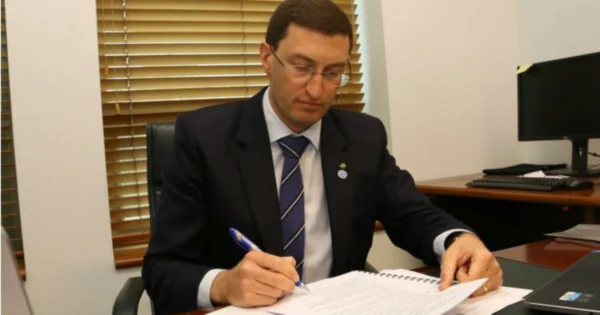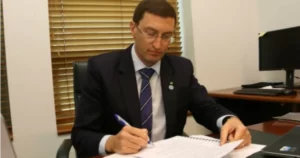Sydney Jewish Museum
4 December 2023
Some years ago, the great Indigenous leader Noel Pearson spoke of the three great chords that tie our nation together.
The first chord is Australia’s indigenous heritage that spans 60,000 years – the oldest continuous human civilisation on Earth.
Here in Darlinghurst, I pay my respects to the Gadigal people of the Eora Nation and pay my respects to Elders past, present and emerging.
The second chord is our British democratic foundation. A foundation built on parliamentary democracy, the separation of powers, the equality of all people no matter their race or creed, and the liberal ideals of the enlightenment.
And the third chord is Australia’s great multicultural identity and future.
Tonight we gather at the Jewish Museum for the launch of the Golimdja William Cooper Memorial Scholarship.
This scholarship is a reflection and an embodiment of the three chords of this great country.
Only in Australia would you see such a scholarship.
Of course, it all starts with the life, values and courage of the great William Cooper.
In the Bain Attwood biography of William Cooper, Attwood argues you can’t understand Cooper unless you understand that he was the product of family, kin and community and their historical experiences.
He makes the wonderful observation that our Western stories begin in a place of time – the date we were born, and the times we were born in.
But Aboriginal people see their stories in terms of space – and place. So a person’s story does not focus on when someone is born, but where.
Connection to place is what anchors you in life.
There are shared experiences of space, belonging, dispossession and identity that have for so long provided an unusual level of understanding between two different people – Jewish people and Australia’s Indigenous peoples.
William Cooper was a Yorta Yorta man.
And the Yorta Yorta story is one of resilience despite adversity.
It is estimated that in 1788, the number of Aboriginal people in what subsequently became the colony of Victoria had been as many as 60,000 people.
By the time of Cooper’s birth in the 1860s, that number had dwindled to fewer than 2,000.
Along the Murray River, where the Yorta Yorta were to be found, that number was but a few hundred.
Disease, infant mortality, and a decline in fertility had all taken their toll.
As an adult, Cooper regularly expressed his fears about the extinction of the Aboriginal people, and it was not a fear without substance.
Cooper became a leader of his people, most likely because of three distinct factors.
The first was his experience as a boy – seeing a white boy almost absorb himself in a piece of paper.
He asked what he was doing and he was told it was reading. And the concept of reading was explained to William.
It was later said that Cooper instantly determined he would become a person who could read better than a white child.
In his own words, with help, he learned to read “one word at a time”.
One word at a time – sometimes in life, the greatest challenges we must master are the ones closest to us – and so it was with William Cooper, teaching himself to read.
The second distinctive factor was the influence of the missionaries and Christian faith on his life.
As a young man on a Christian mission, Cooper and his brethren were taught to identify with the Jews of the Bible and learned spirituals such as “There is a happy land, far, far away”.
And the third factor was that the missionaries taught him about what it meant to be part of a country of laws. We were all citizens under the Crown.
This all led to Cooper’s political organising for the Australian Aborigines’ League during the 1920s and 1930s when he was in his fifties and sixties.
The historic culmination being his petitioning of the King in 1933 for Aboriginal representation in the Federal Parliament. This was the first call for Indigenous Constitutional Recognition.
Though history took many different turns than he expected, I am sure he never imagined there would come a day when there would be 11 Indigenous members of parliament from different parties, states and backgrounds.
Cooper has a special place in the story of Jewish Australians because of his actions after Kristallnacht.
On December 6, eighty-five years ago Cooper led a protest to the German Consulate protesting the Nazi violence and oppression.
In the words of former Israeli Ambassador Yuval Rotem, Cooper’s actions made him a “hero to Jewish people and an inspiration to mankind”. So true.
It should be noted Cooper did this in a time which was the nadir for Aboriginal people – with population falling, invisible to society, with few advocates and defenders.
In reflecting on Cooper’s actions, I want to add an important observation made by Bain Attwood in his biography of William Cooper.
Attwood observes that in many ways Cooper’s actions that December night have formed a dominant part of the historical story of Cooper – because his action had no equivalent throughout the world.
Yet Cooper’s actions were brief and instinctive, and we are challenged as Australians not to narrow the story of Cooper to this one brave event.
Rather, we are reminded that the focus of Cooper’s life was the education, advancement and place of Aboriginal people in our national life.
And that is what is so wonderful about this scholarship.
It takes that night of courage, and repays it by focusing our attention on what William Cooper’s life of courage was about: creating opportunity for Indigenous leadership in this land.
William Cooper’s life was about lifting Indigenous communities through Indigenous opportunity. That’s what we are adding to tonight.
What a wonderful way to pay back and to pay forward as well.
During the recent referendum, I was struck by the juxtaposition of two facts.
The first was the fact that an Indigenous boy in Australia is more likely to go to prison than university. A terrible, terrible fact.
And the second fact, is that if an Indigenous person graduates from university, that he or she will, on graduation and five and ten years later, have an average income as high as that of non-Indigenous graduates.
In other words, that gap we talk about – the gap in health, employment, income, and so many other factor – closes.
So a scholarship like the Golimgja William Cooper Memorial Scholarship not only benefits the recipient, but their descendants and their community as well. Immediately, and way into the future.
As we understand as Jewish people, and Cooper understood as an Indigenous man – we are connected to kin, clan, community and country.
This scholarship allows recipients to study either interdisciplinary development, agriculture or in bio-medicine at the Hebrew University of Jerusalem.
Development, agriculture and bio-medicine are all areas so vital to Indigenous advancement.
I want to acknowledge the generosity of Ilana and Martin Moshal who have wonderfully demonstrated again the great contribution of Jewish Australians to our national life. Thank you for your generosity.
Cooper in his petition to the King wrote of the moral duty that “the heirs and successors of this land” have to the original inhabitants of the land. Ilana and Martin are shining lights fulfilling that wonderful duty.
Friends, I am also delighted to be here tonight, because we live in times that require us to do two things.
The first is to respond to the urgency of the moment, and this is a difficult time for Jewish people around the world – and we will respond to it as we’ve always done – with strength and courage.
And the second thing our times require us to do, is to keep being a difference in the world.
To build, to lift, to empower, to be generous, to be Jewish in the ways our faith and community teaches us. Our times demand that as well – and that is what we are doing tonight.
Whilst there is a time for everything under heaven, we know there is always a time to plant, and to build – and always a time to be a light amongst the nations.
This is what we are called to do.
And that is what William Cooper did and that is what we should continue to do.



